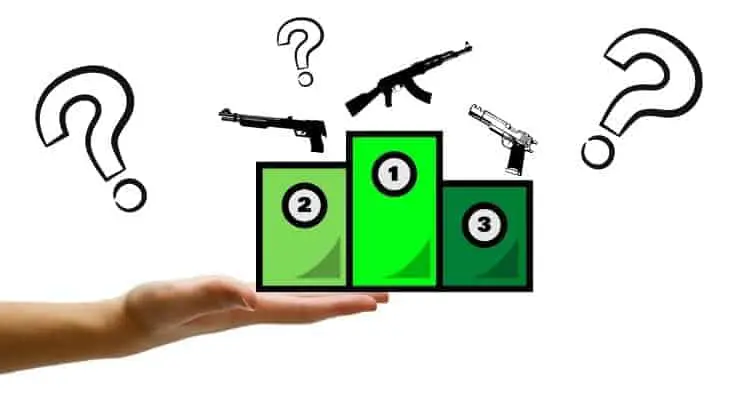In this post, we take a look at making sense of tier lists in video games. There are tier lists for game characters or agents, for weapons, for equipment or spells. But how useful are these lists?
Tier lists represent the subjective feeling of a player. Each player uses the game characters, weapons, equipment, etc., depending on their play style. Therefore, a tier list from another player will usually not reflect your preferences.
I think agent or weapon tier lists are nothing more than useless content that different players and gaming review platforms have developed as a mere reflection of their feelings.
In this article, I aim to present my point of view about these tier lists. I justify my viewpoint rationally and explain in detail why these tier lists can be an excellent way to get some traffic for your website but have no more practical value than this.
Why did I mention the traffic? Well, primarily because such tier lists are a hot topic, particularly among multiplayer gamers. In addition, the growing Gaming and eSports industry has brought such tier lists to the limelight as players and fans now focus on the methodology being followed by chart-toppers.
The article explains how the various tier lists are mainly based on players’ personal experiences rather than facts and figures.
This makes such lists susceptible to being biased.
Note: This article was written in English. Translations into other languages may not provide the same linguistic quality. We apologize for grammatical and semantic errors.
What Is A Tier List For Agents Or Weapons?
What exactly is a tier list, and why do people like to read about them? What makes them so interesting to their creators is the fact that any tier list on a reputable review site gets thousands, if not millions, of views?
The reason is that avid gamers often find such tier lists interesting as they feel that these lists provide them the help needed to overcome the gameplay obstacles with ease.
Different Categories
A tier list is the division of agents or weapons into different categories in ascending or descending order. Usually, the best contestants are placed in the S category and the ones coming afterward are further categorized into A, B, and C categories.
Categories Per Tier List
The number of categories in the tier list of a game depends primarily on the number of agents or weapons available. The tier list of Apex Legends, for example, is often extended as far as the “F” category.
Although weapons in a tier list are divided based on various attributes, the lists vary from one platform to another and from player to player. This is because the scoring system isn’t objective, and every player awards points as per their liking.
Key Attributes of Tier Lists
Some of the attributes that play a vital role in the scorecard, of weapons, for example, include:
- Reload Speed;
- Fire Rate;
- Damage Per Second;
- Magazine Capacity.
Ranking Criteria For Agent Tier Lists Is A Bit Different
Similarly, the agent tier lists present the different agents featured by games like Valorant, for instance. The agent tier lists are similar to the weapon tier lists, but crafting them is different. Instead of characteristics like reload speed and magazine capacity, such lists are based on attributes like the agent’s strength or agility.
Players are interested in such tier lists as they believe they can easily help them achieve their desired goals. But I dare to disagree. Why so? Let me explain but let’s first see why such tier lists are incredibly short-lived.
Honest recommendation: You have the skill, but your mouse doesn't support your aiming perfectly? Never struggle with your mouse grip again. Masakari and most pros rely on the Logitech G Pro X Superlight. See for yourself with this honest review written by Masakari or check out the technical details on Amazon right now. A gaming mouse that fits you makes a significant difference!
Why Do Tier Lists Change?
Websites that feature game-related tier lists always inform readers about the patch or update for which the tier list is valid. In addition, the date at which the tier list was last edited is also important because the change in such lists is a continuous process.
All modern-day games undergo updates through patches that are presented from time to time. So, whenever a game undergoes an update, the overall gameplay dynamics change.
Sometimes, the variations are insignificant, but mostly, they bring significant changes to the gameplay. As you can imagine, such changes also affect the rankings of the game’s agents and weaponry.
So, mostly these tier lists become obsolete whenever a new update is presented to players. This means that agent or weapon tier lists are temporary, and their lifespan is limited until the game is patched.
This raises the following question in general gamers’ minds: how frequently are games updated after all? Of course, you can say nothing with certainty in this regard as it is each game developer’s personal preference. So, if a title is performing well, there is no need to launch a new update.
This was true in the past, but multiplayer games have changed the game dynamics significantly. With every new season launched in the game, a new patch is presented, which, when downloaded, offers added features but at the cost of changing gameplay dynamics. Resultantly, all previous tier lists become ineffective immediately.
Take PUBG Mobile, for example. The game has undergone at least 19 updates during the past three years. This translates to 19 different tier lists, as each update makes the previous tier list null and void.
I wouldn’t say I like these tier lists, as even when a lot of effort has been put into making them, each game update makes them insignificant and completely useless. So, why invest so much time and effort into something so temporary? And this is precisely my point.
Why Are Tier Lists Not Objective?
All gameplay tier lists, regardless of whether they cover agents or weapons, are highly subjective. So what is a subjective list? It means that my tier list of a game will be different from yours. But why so?
Simply because every player identifies different gameplay mechanics as more significant, and for him, one aspect might be more important than others. Everyone is free to think as he wills, which is why something meaningful for one gamer might not seem that vital to another player.
Gaming Approach Varies
Take a first-person shooter game, for instance. I like to annihilate my enemies from a distance. For this, I found a perfect hiding spot located high enough to get a good view. Then I use my sniper rifle’s scope for picking out enemies that can’t even see me. This has the added benefit that I face lesser risks while playing. So, I would rank the sniper rifle higher than other weapons available in the game.
However, a gamer with a more aggressive stance would like to blast his way through clusters of enemies, destroying them with rifles, grenades, and machine guns. For such a gamer, these weapons yield better results, and thus he will rate them higher.
Preferences Of Novice & Experienced Players Differ
Another important thing that determines tier lists is the overall experience that a player has. For example, a new gamer might have a bird’s eye view of the overall gameplay and think he knows what to do to perform well in the upcoming sessions. Such a player might succeed for a while, but once the gameplay dynamics change, he won’t be able to get much success.
A professional gamer with years of multifaceted experience will think differently about the game’s agents or weapons. Thus, the tier list put forward by such a gamer will vary significantly from that of a newbie.
Even Pro-Level Gamers Make Predictions
However, but even professional gamers don’t always know what makes a title successful, so even their opinion is a simple guess at best. So even their predictions can be wrong.
Game Developers Don’t Create Tier Lists
Only the game developers are fully aware of how the gameplay has been designed, and thus I feel only they can have an objective approach. However, no game developer ever releases a tier list, and thus players need to understand that such tier lists are nothing more than a wastage of time.
The only thing that can assist gamers is their experience related to a game, and the more time that a player spends in a title, the more experience he gains.
So, long story cut short, avoid these tier lists and focus only on the gameplay, which is the only key to success.
Conclusion
Hand on heart, I also find it exciting at first glance to see pro gamers or well-known streamers like Shroud rank various elements in a shooter. For example, a rough idea of which weapons or agents are good can perhaps give a tier list. But as soon as this list is older than the last update, it just doesn’t make sense to derive anything from it.
After an update, it is much more important to test the game elements on a training map, deathmatch, or a self-made custom game. For example, maybe a weapon has changed in such a way that it suits my play style. Or the characteristics of a character result in a meta that is suddenly perfect for me.
Sometimes it’s just like choosing the best equipment: whatever you feel most comfortable with will give you the best results.
Other posts you’ll probably like:
Is Shroud the Best Gamer in the World? (+FAQs answered)
Why Are First Person Shooters So Popular? (11+ Reasons)
Odds for Becoming a Pro Gamer [Calculation Included]
If you have a question about the post or pro gaming in general, write to us: contact@raiseyourskillz.com.
If you want to get more exciting information about becoming a pro gamer and what relates to pro gaming, subscribe to our newsletter here.
GL & HF! Flashback out.

